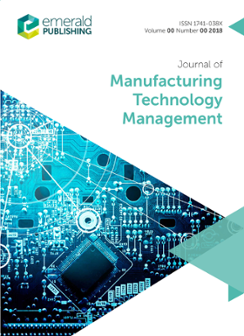Leveraging blockchain and NFTs for quality 4.0 implementation in digital manufacturing
IF 7.3
2区 工程技术
Q1 ENGINEERING, INDUSTRIAL
引用次数: 0
Abstract
PurposeQuality 4.0 (Q4.0) leverages new emerging technologies to achieve operational excellence and enhance performance. Implementing Q4.0 in digital manufacturing can bring about reliable, flexible and decentralized manufacturing. Emerging technologies such as Non-Fungible Tokens (NFTs), Blockchain and Interplanetary File Storage (IPFS) can all be utilized to realize Q4.0 in digital manufacturing. NFTs, for instance, can provide traceability and property ownership management and protection. Blockchain provides secure and verifiable transactions in a manner that is trusted, immutable and tamper-proof. This research paper aims to explore the concept of Q4.0 within digital manufacturing systems and provide a novel solution based on Blockchain and NFTs for implementing Q4.0 in digital manufacturing.Design/methodology/approachThis study reviews the relevant literature and presents a detailed system architecture, along with a sequence diagram that demonstrates the interactions between the various participants. To implement a prototype of the authors' system, the authors next develop multiple Ethereum smart contracts and test the algorithms designed. Then, the efficacy of the proposed system is validated through an evaluation of its cost-effectiveness and security parameters. Finally, this research provides other potential applications and scenarios across diverse industries.FindingsThe proposed solution's smart contracts governing the transactions among the participants were implemented successfully. Furthermore, the authors' analysis indicates that the authors' solution is cost-effective and resilient against commonly known security attacks.Research limitations/implicationsThis study represents a pioneering endeavor in the exploration of the potential applications of NFTs and blockchain in the attainment of a comprehensive quality framework (Q4.0) in digital manufacturing. Presently, the body of research on quality control or assurance in digital manufacturing is limited in scope, primarily focusing on the products and production processes themselves. However, this study examines the other vital elements, including management, leadership and intra- and inter-organizational relationships, which are essential for manufacturers to achieve superior performance and optimal manufacturing outcomes.Practical implicationsTo facilitate the achievement of Q4.0 and empower manufacturers to attain outstanding quality and gain significant competitive advantages, the authors propose the integration of Blockchain and NFTs into the digital manufacturing framework, with all related processes aligned with an organization's strategic and leadership objectives.Originality/valueThis study represents a pioneering endeavor in the exploration of the potential applications of NFTs and blockchain in the attainment of a comprehensive quality framework (Quality 4.0) in digital manufacturing. Presently, the body of research on quality control or assurance in digital manufacturing is limited in scope, primarily focusing on the products and production processes themselves. However, this study examines the other vital elements, including management, leadership and intra- and inter-organizational relationships, which are essential for manufacturers to achieve superior performance and optimal manufacturing outcomes.利用区块链和NFT在数字制造中实现质量4.0
PurposeQuality 4.0(Q4.0)利用新兴技术实现卓越运营并提高性能。在数字化制造中实施Q4.0可以带来可靠、灵活和分散的制造。非可替代代币(NFT)、区块链和星际文件存储(IPFS)等新兴技术都可以在数字制造中实现Q4.0。例如,NFT可以提供可追溯性以及财产所有权管理和保护。区块链以可信、不可变和防篡改的方式提供安全和可验证的交易。本文旨在探索Q4.0在数字制造系统中的概念,并为在数字制造中实现Q4.0提供一种基于区块链和NFT的新解决方案。设计/方法论/方法本研究回顾了相关文献,并提出了详细的系统架构,以及展示不同参与者之间互动的序列图。为了实现作者系统的原型,作者接下来开发了多个以太坊智能合约,并测试了设计的算法。然后,通过对其成本效益和安全参数的评估,验证了所提出系统的有效性。最后,这项研究为不同行业提供了其他潜在的应用和场景。发现所提出的解决方案中管理参与者之间交易的智能合约已成功实施。此外,作者的分析表明,作者的解决方案具有成本效益,能够抵御常见的安全攻击。研究局限性/含义本研究代表了探索NFT和区块链在数字制造中实现全面质量框架(Q4.0)的潜在应用的开拓性努力。目前,数字制造中质量控制或保证的研究范围有限,主要集中在产品和生产过程本身。然而,这项研究考察了其他重要因素,包括管理、领导力以及组织内和组织间关系,这些因素对制造商实现卓越绩效和最佳制造结果至关重要。实际意义为了促进Q4.0的实现,并使制造商能够获得卓越的质量和显著的竞争优势,作者建议将区块链和NFT集成到数字制造框架中,所有相关流程与组织的战略和领导目标保持一致。独创性/价值本研究代表了探索NFT和区块链在数字制造中实现全面质量框架(质量4.0)的潜在应用的开拓性努力。目前,数字制造中质量控制或保证的研究范围有限,主要集中在产品和生产过程本身。然而,这项研究考察了其他重要因素,包括管理、领导力以及组织内和组织间关系,这些因素对制造商实现卓越绩效和最佳制造结果至关重要。
本文章由计算机程序翻译,如有差异,请以英文原文为准。
求助全文
约1分钟内获得全文
求助全文
来源期刊

Journal of Manufacturing Technology Management
Engineering-Control and Systems Engineering
CiteScore
16.30
自引率
7.90%
发文量
45
期刊介绍:
The Journal of Manufacturing Technology Management (JMTM) aspires to be the premier destination for impactful manufacturing-related research. JMTM provides comprehensive international coverage of topics pertaining to the management of manufacturing technology, focusing on bridging theoretical advancements with practical applications to enhance manufacturing practices.
JMTM seeks articles grounded in empirical evidence, such as surveys, case studies, and action research, to ensure relevance and applicability. All submissions should include a thorough literature review to contextualize the study within the field and clearly demonstrate how the research contributes significantly and originally by comparing and contrasting its findings with existing knowledge. Articles should directly address management of manufacturing technology and offer insights with broad applicability.
 求助内容:
求助内容: 应助结果提醒方式:
应助结果提醒方式:


